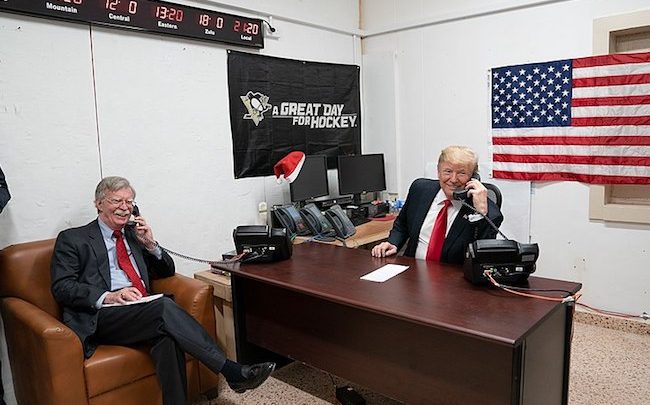A more nakedly aggressive United States

By M Waqas Jan
Of all the instability and unrest the US has been accused of fomenting over the last three years, no other example comes close to the lengths the US has gone to in its unilateral attempt at isolating Iran. Long accused by Russia and other major powers as the leading cause of instability in the Middle East, the recent escalation of tensions between Iran and the US forms part of a wider more troubling trend. This has included the US ratcheting up tensions with both friends and foes alike such as the escalating trade war with China, calls for regime change in Venezuela and the estrangement of its allies across both the European Union and NATO.
The last bit, regarding the US’s growing differences with the EU’s major powers such as France and Germany is also to a large extent directly linked with its hardline stance on Iran. This is evident in the clearly divergent stances both the US and EU have taken regarding Iran’s Nuclear program. President Trump’s unilateral withdrawal from the Joint Comprehensive Plan of Action (JCPOA) last year had brought about considerable shock and dismay amidst European powers that had spent years negotiating the agreement with Iran alongside the US. Signed back in 2015, the JCPOA had set a historic precedent in international diplomacy, garnering support from China and Russia as well as the US, UK, France, Germany and the EU. Based on years of painstaking negotiations it was widely hailed as presenting a successful model for Nuclear Arms Control and non-proliferation.
In fact, a number of experts had hailed the JCPOA as being even better than the Nuclear Non-Proliferation Treaty (NPT) in a number of ways. Its emphasis on monitoring other research and attempts at nuclear weaponisation beyond the involvement of nuclear materials was a major step in further expanding the role and scope of the IAEA’s monitoring mechanisms. These same mechanisms which based on the consensus of world powers have been successful in both monitoring and limiting Iran’s attainment of Nuclear weapons capability. The only exception has been the United States, and particularly the Trump White House that has made it a policy imperative to undo the years of work put in by both former US President Obama and Secretary of State John Kerry.
President Obama had even quite recently publicly lamented how reneging on the JCPOA not only undermined the United States credibility as a negotiating partner, but also dismantled a whole non-proliferation mechanism that was to prove crucial in addressing the growing threat from North Korea as well. As apparent in the failure of the recent talks between the US and North Korea in Vietnam, the US’s seriousness and commitment to the non-proliferation regime has been openly questioned as it continues to prioritize its own geo-political imperatives. Its ‘maximum pressure’ campaign on Iran, which is flirting dangerously with yet another large-scale military conflict involving US armed forces, threatens to undo the last decades’ painstaking rollback of US troop deployments throughout the Middle East.
Since the end of the Cold War, the US’s unilateralism and more maximalist approach was never in question considering its series of interventions particularly in the Middle East. There was however a semblance of unity and International leadership which either under the aegis of the UN or NATO still more or less carried the garb of a multi-lateral consensus. That instead of simply employing naked aggression as accused of by its adversaries, the US was justified by its ideology and the success of its international diplomacy. This perhaps was best and most positively evident in the JCPOA, which had brought all the world’s major powers into a concerted agreement on one of the world’s most pressing issues, namely Nuclear Proliferation.
However, as the Trump administration beats its war drums to the tune of nothing short of a regime change in Iran, there is most definitely a marked difference in how the US has previously built its cases for military intervention in the Middle East. In the absence of any international support from its partners, or in the lack of any overarching ideal based on non-Proliferation or plain old human freedoms (à la Iraq), the recent case for the US military intervention in Iran appears outright indolent if not unjustified as has mostly been the case with US hegemony over the last few years.




